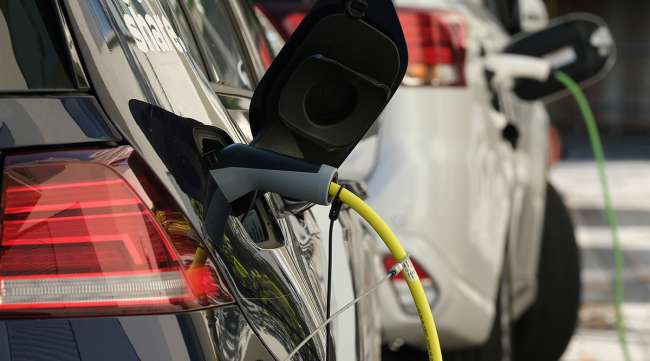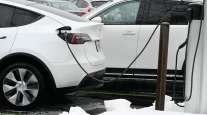The Detroit News
Democrats Unveil New EV Tax Credit Proposal

[Stay on top of transportation news: Get TTNews in your inbox.]
WASHINGTON — Democrats in Washington want to include a significant new incentive to buy electric vehicles in their $3.5 trillion social spending bill, according to a new plan revealed by the House Ways and Means Committee.
For five years, the legislation would implement $7,500 point-of-sale consumer rebates for electric vehicles and pay out an additional $4,500 for vehicles assembled in a union facility. Another $500 would be awarded for vehicles using a battery manufactured in the U.S.
PLAN DRAWS IRE: Nonunion automakers claim discrimination
For the next five years after that, the $7,500 base credit would only apply to electric vehicles made in the U.S., but the other two incentives would stay the same.

Kildee
“We want to make sure that people who make good wages, support their families and contribute those wages and benefits in their community are the primary beneficiaries of this,” said Rep. Dan Kildee (D-Mich.) who serves on the Ways and Means Committee and has been pushing the legislation in the House.
The first five years should incentivize EV adoption and domestic battery production, while the latter half should narrow it down to domestic producers, he said.
“We think that gives everybody ample time to understand that when it comes to the American tax dollar, we’re not going to do this in a way that is so disruptive to the market,” Kildee said.
But “within five years we’re making it clear these dollars are going to people who make good wages in American factories, and that’s where the American tax dollar should go.”
The legislation also seeks to bar the wealthiest Americans and luxury vehicle producers from benefiting from the program by setting caps on income and sale price to qualify.
Sedans under $55,000, vans under $54,000, SUVs under $69,000 and pickup trucks under $74,000 would be eligible for the credits. Individuals with an adjusted gross income of up to $400,000, heads of households making up to $600,000 and joint filers making up to $800,000 would be able to use the program.
The income caps are significantly higher than that proposed by Senate Republicans, who voted in a nonbinding amendment in August to stop buyers from claiming credits if they make more than $100,000 annually or if the vehicle costs more than $40,000.

Fleet managers find that healthy, happy drivers are key to business success. Stephen Kane of Rolling Strong says driver health starts with “being vulnerable enough to listen to somebody that knows about health.” Hear a snippet above, and get the full program by going to RoadSigns.TTNews.com.
The higher income cap will make it possible for 98% of taxpayers to use the credit and ensure those who are not the wealthiest Americans are held harmless from the legislation, Kildee said.
“The vast majority of the people who benefit from this will make significantly less than” $400,000, Kildee said. “But we’re trying to remain consistent with the president’s pledge that people making less than $400,000 won’t see a tax increase. Taking this credit away from them, in a sense, would be tantamount to a tax increase.”
Republicans largely oppose the push to expand incentives, arguing the policy favors wealthy car buyers and tips market scales in favor of technology with weak supply chains that consumers aren’t yet demanding.
GOP members are not expected to vote for the $3.5 trillion social spending plan that Democrats plan to pass along party lines using a “reconciliation” budget process, which allows them to overcome the 60-vote threshold needed to pass most legislation in the Senate.
The House Ways and Means Committee will vote on whether to include the consumer credit legislation in the reconciliation bill next week.
Democrats will need to remain in lockstep to pass the legislation without the help of any Republicans. They have a 220-212 majority in the House and a razor-thin 50-50 majority in the Senate, with Vice President Kamala Harris casting the tie-breaking vote.
House Democrats have been working with leaders in the Senate and the White House to agree on an incentive structure that “we can get across the finish line,” Kildee said. “I think it will be included no matter what the scale of the broader legislation might be.”
President Joe Biden has called for $174 billion for U.S. manufacturers to “win” the electric vehicle market, which is expected to grow rapidly in coming years. His original proposal included $100 billion in consumer incentives and $15 billion to build a nationwide network of EV charging stations.
Want more news? Listen to today's daily briefing below or go here for more info:
Distributed by Tribune Content Agency, LLC




